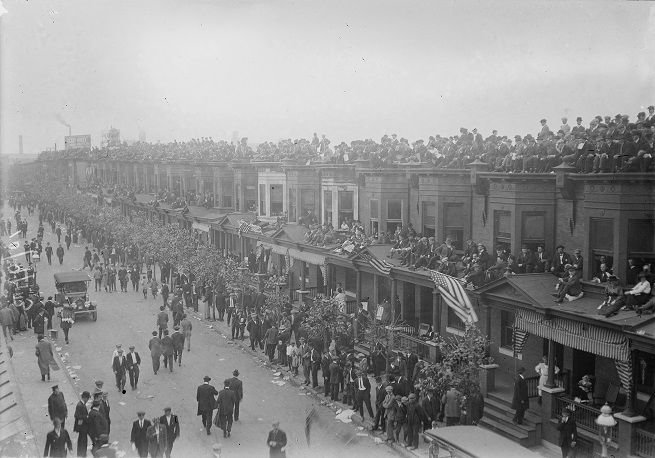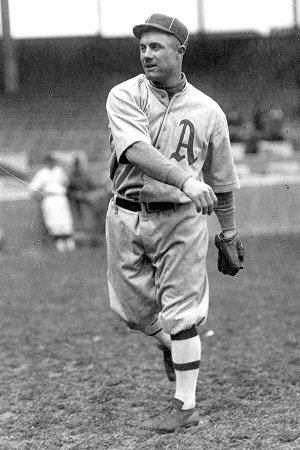
People sat on rooftops to watch the Athletics during their World Series run in 1913. Shibe Park was infamous for the masses that gathered and sat on houses to watch the Athletics.
Who were the Athletics?
When people think of Philadelphia baseball, they typically think of the Philadelphia Phillies. That makes sense, because the Phillies, who still play in Philadelphia have a longer continuous history than the Athletics. Yet, it is the Athletics franchise that has nine World Series titles, the third most in the history of baseball, behind only the Yankees and the Cardinals. Therefore, the 1918 Major League Baseball season featured two Philadelphia teams. One in the National League, the Phillies, and one in the American League, the Athletics.

The logo of the Athletics
Represented by a single blue A, the Athletics had a big presence in Philadelphia despite their losing record. They played their games at Shibe Park which was at the corner of West Lehigh and 21st Street near North Philadelphia. The Athletics also made the white elephant a well known symbol in the baseball world. As reporters often referred to them as white elephants, a rare and impressive animal, in previous games, the nickname stuck and white elephants were worn on Athletics jerseys. Even today, the current incarnation of the Philadelphia Athletics, now based in Oakland, California uses the white elephant as its symbol. Below is the 2017 spring training hat for the Oakland Athletics, still featuring the white elephant.

Wasn't 1918 too busy for baseball?
If you have seen some #explore1918 posts, you probably know that 1918 was an eventful year for Philadelphia. Not only did an influenza epidemic grip the city, but World War I was also still happening. Still, 130 games were played in a full Major League Baseball season. Sometimes, even at times of war and devastating death, sports serve their true purpose and offer people a much needed distraction from daily life. Unfortunately for the people of Philadelphia, the Athletics provided even more suffering, as they finished in last place in the American League.

Athletics outfielder for the 1918 season, Merlin Kopp
Why Does it Matter to Historians?
One of the greatest challenges of history is not only explaining the extraordinary events of the past, but also the daily experiences of people in the past. It is easy to get lost in epidemics and wars, but sometimes that is not the most meaningful part of the past. A history of the ordinary must consider what people thought about on a daily basis, and with hundreds of thousands of viewers over their one-hundred and thirty game season, an average Philadelphian likely spent a large amount of time watching, listening, or thinking about the Athletics.
One can imagine old friends with children or grandchildren fighting in Europe meeting at the ballpark to watch the Athletics and get a break from the constant stream of worry. It is possible to think of the vendors who sold food at the ballpark and played an important part of the local economy. From baseball, we see material history high-stockings remain stylish even one-hundred years later. Ultimately, history is not just tragedy and conflict in the past but also an analysis of the entire past in which people existed on a daily basis.
While the last place finish of the Philadelphia Athletics surely created frustration, it is more likely that the people who attended games remembered the people they went with and the moments they shared away from work and the toil of daily life.
click here.100% of the SBD rewards from this #explore1918 post will support the Philadelphia History initiative @phillyhistory. This crypto-experiment is part of a graduate course at Temple University's Center for Public History and is exploring history and empowering education to endow meaning. To learn more
Nice! I appreciate that your posts include an explanation of your topics' significance, and the reminder that while "important" events are going on, people are still just living their lives.
You've got to be kidding me. I wrote a short 300 word biography on Rube Waddell with Connie Mack in a contest a few weeks ago. Just to find out it was supposed to be a fictional story so I had to dump it and write something else. Shibe Park now that is some baseball history. I love it, home of great teams, great rebuilds, and the great Cornelius McGillicuddy (Connie Mack's birth name). Great stuff @hourofhistory excellent post!
Thanks @cryptkeeper17 - Connie Mack is an incredible figure with a huge history that often creeps into hagiography and mythology. The longest serving manager in baseball history he started in 1901 and continued to 1950. How's that for a career?